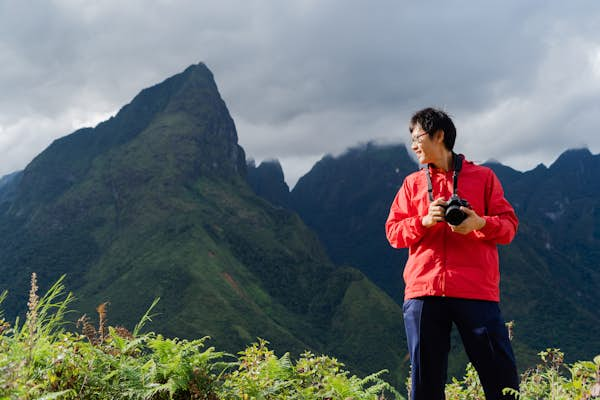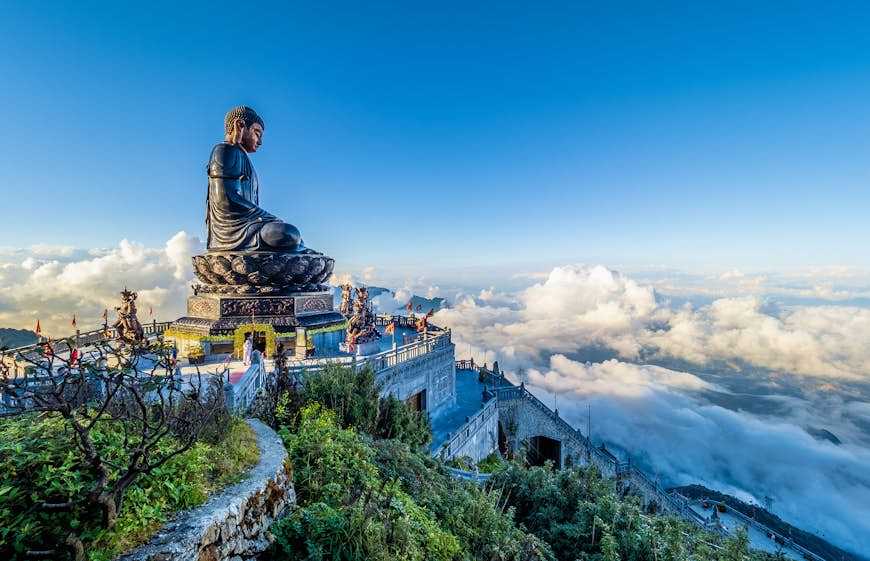
Modern Vietnam is a million miles from its war-torn past.
Jungle-cloaked hills that once shook with the sound of combat are now the serene setting for adventurous hikes to remote villages, lofty lookouts, tumbling waterfalls and the summit of Indochina’s highest mountain. With plenty of local guides and trekking agencies on hand to help you to the top of the trails, all you really need to do is pick a route – and set out.
Immerse yourself in the best experiences the world has to offer with our email newsletter delivered weekly into your inbox.
Many of Vietnam’s top hikes are best attempted with local support. The tropical terrain can be challenging, the weather can be unpredictable and you’ll need someone who speaks the local languages to make arrangements for meals and accommodation in hill-tribe communities. If you combine a trek with a village homestay – which we heartily recommend – it’s possible to escape the crowds and find the hospitality and captivating culture that first put Vietnam on the travel map.
With its towering topography, the mountainous north of the country offers the best trekking opportunities, but there are routes all over the country, from the Chinese border to the lowland jungles near Ho Chi Minh City. Here’s our pick of the top treks in Vietnam.
1. Cultural treks from Sapa
Easiest hikes for beginners
Distances vary, 1–2 days, easy
Hill-tribe treks from Sapa are a core part of the tourist experience in northern Vietnam, and hiking here is quite mainstream these days. Still, there are still rewarding experiences to be had if you go with a guide who speaks the languages of local minority groups and can get you acquainted with the diverse communities that French colonizers grouped together under the umbrella term Montagnards (mountain-dwellers).
Don’t expect to get too far off the beaten track – the most popular villages have entry fees, souvenir shops and a rather entrepreneurial attitude towards tourism. Favor treks to Sin Chai, Cat Cat, Ban Ho, and Y Linh Ho, which will take you away from the heaviest crowds. For a more authentic experience, trek over two days with an overnight stop in a local homestay, or save your trekking for a more remote location such as Bac Ha or Ba Be National Park.
2. Tribal treks around Bac Ha
Best treks for tribal encounters
7–10km (4–6 miles), 1–3 days, easy to moderate
Quite how Bac Ha slipped under the radar as a trekking base is a mystery: the village remains a charmingly unspoiled hub for hikes to the villages of 11 tribal groups, including the Flower Hmong, Dzao, Giay, Han, Xa Fang, Lachi, Nung, Phula, Tay, Thai, and Thulao. To really get a feel for local life, go with a local guide and stay overnight in villages tucked away in the emerald hills.
For an easy day hike, try the 8km (5-mile) hike through the Flower Hmong village of Thai Giang Pho to the Tay village of Na Lo, passing some of the finest rural scenery anywhere in northern Vietnam. For a great overnight route, test your legs on the 10km (6.2-mile) hike through rice paddies, cinnamon forests and misty hills to the Dzao villages of Nam Det and Nam Khanh.
Wherever you trek, aim to be back in Bac Ha by the weekend: the Sunday market in Bac Ha and the Saturday market in nearby Can Cau both draw tribal people from across the region. There are also markets in the villages of Coc Ly, Lung Phin and Sin Cheng.
 Vietnam’s highest mountain, Fansipan presents a satisfying challenge for hikers © Getty Images / iStockphoto
Vietnam’s highest mountain, Fansipan presents a satisfying challenge for hikers © Getty Images / iStockphoto
3. Fansipan
Best mountain trek
9–20km (5.5–12.5miles), 1–3 days, moderate to difficult
At 3147m (10,326ft), Vietnam’s highest mountain presents a satisfying challenge – though the paths are rough and regular rain means the going can be slippery underfoot. As you climb the slopes of Fansipan, expect adrenaline-inducing scrambles up steep slopes and gasp-producing views across the Tonkinese Alps when the clouds clear.
The summit of the mountain known as the “roof of Indochina” is most easily reached from the Tram Ton pass on the northern side of the mountain, accessible by local bus from Sapa. There are also challenging alternative trails starting from the villages of Cat Cat and Sin Chai that require camping for one or two nights.
Guides are mandatory – and sensible in this rugged terrain – though some travelers sneak up the trails unaccompanied. Fit trekkers can tackle the Tram Ton trail in a day, returning via the cable car across the Muong Hoa Valley. Most people cover the ascent over two or three days, camping at rustic sites along the way. With scenery so lovely, why rush the journey?
4. Ba Be National Park
Best treks for escaping the crowds
Distances vary, from 1 day, moderate
Lush, green Ba Be National Park offers everything you could ask for from the Vietnamese highlands: limestone peaks climbing out of misty valleys lined with ribbon-like lakes, dense jungles hiding myriad bird, mammal and butterfly species, and a dozen villages populated by the Tay, Dzao and Hmong communities. Best of all though, Ba Be is still largely undiscovered by the masses, even if word is slowly getting out.
Treks here are as they were in Sapa a generation back, offering a deep dive into mountain culture and a way of life that still moves with the rhythms of the seasons. As well as sampling village life, you can drop in on dramatic waterfalls and tortuous cave systems, and stop overnight at quiet homestays overlooking the lakes.
 The jungles of Cat Ba National Park offer a lush palette of greens © Shutterstock / Stephane Bidouze
The jungles of Cat Ba National Park offer a lush palette of greens © Shutterstock / Stephane Bidouze
5. Cat Ba National Park
Best island adventure trek
Distances vary, 1–2 days, moderate
The scenery in Cat Ba National Park in Halong Bay is almost impossibly green, with beds of moss and forest glades exhibiting a spectrum of emerald, lime, chartreuse and other hues. And this vivid landscape is best experienced on foot, starting from the park headquarters at Trung Trang. While guides are not obligatory, they’ll help you get closer to the wildlife: be sure to keep an eye out for golden-headed langurs, the world’s most endangered primate.
The “easy” option here is the short, strenuous hike to the top of Ngu Lam peak, a modest ridge offering views over the surrounding jungle, though many opt for the more challenging 9km (5.5-mile) hike across the park to the fishing village of Viet Hai, where you can stop over at a friendly homestay. The park is also a great spot for climbing, with several operators running trips to local karst outcrops with all gear included.
 The lowland tropical rainforest of Nam Cat Tien National Park teems with biodiversity © Shutterstock / Quang nguyen vinh
The lowland tropical rainforest of Nam Cat Tien National Park teems with biodiversity © Shutterstock / Quang nguyen vinh
6. Cat Tien National Park
Best trek in southern Vietnam
2–26km (1.2–16 miles), 1–3 days, moderate to difficult
The south of Vietnam is often overlooked by trekkers. Don’t make that mistake.
Cat Tien National Park covers 72,000 hectares (177,916 acres) of lowland tropical rainforest that teems with biodiversity. While there are elephants and leopards hiding amid the foliage, you’re more likely to spot primates such as gibbons, pygmy lorises and langurs, alongside reptiles, amphibians and myriad bird species.
Guides can be arranged through local lodges. The most popular trip is the half-day hike from the national park headquarters in search of golden-cheeked gibbons, though this involves an early start to catch the primates’ hooting dawn chorus. Most trekkers drop in on the Dao Tien Endangered Primate Species Centre for more simian encounters; trip fees help fund the park’s conservation activities.
7. Mai Chau villages
Best easy hikes near Hanoi
5–18km (3–11 miles), 1–2 days, easy
You don’t have to roam far from Hanoi to find good hiking terrain. The township of Mai Chau floats on a green carpet of rice fields, about 135km (84 miles) southwest of the capital. This is pretty rather than challenging terrain, with the most popular destinations for walks villages inhabited by the White Thai. These people are known for their colorful textiles, which you can purchase without too much bargaining.
For a taste of what the area has to offer, try the 18km (11-mile) trek from Ban Lac village to Xa Linh village. A local guide will help you navigate the slippery trail, and you’ll need to arrange a vehicle to meet you at the end of the trail for the trip back to Mai Chau. Longer treks can be arranged through local homestays and lodges, though we recommend coming during the week to avoid the weekend crowds.
8. Cao Bang
Best off-the-beaten-track treks
Distances and durations vary, moderate to difficult
Tucked away near the Chinese border in the far northeast of Vietnam, Cao Bang is the place to discover rural communities that have so far escaped the influence of mass tourism. This comes with a degree of responsibility, so be sure to trek with a guide and stay in village homestays to make sure your tourist dollars reach the local economy. The main destinations for hikers are hillside villages of the Tay, Nung, Hmong, Dzao and Lolo people, with markets that shift from village to village on different days of the lunar month.
There are easy strolls around Ban Gioc Waterfall and Nguom Ngao Cave – both served by local buses from Cao Bang – but to access outlying villages, you’ll need local support. Most treks are multi-day affairs, and your guide will need to make arrangements for overnight stays. It may be easiest to organize a trek through a reputable agency in Hanoi.



